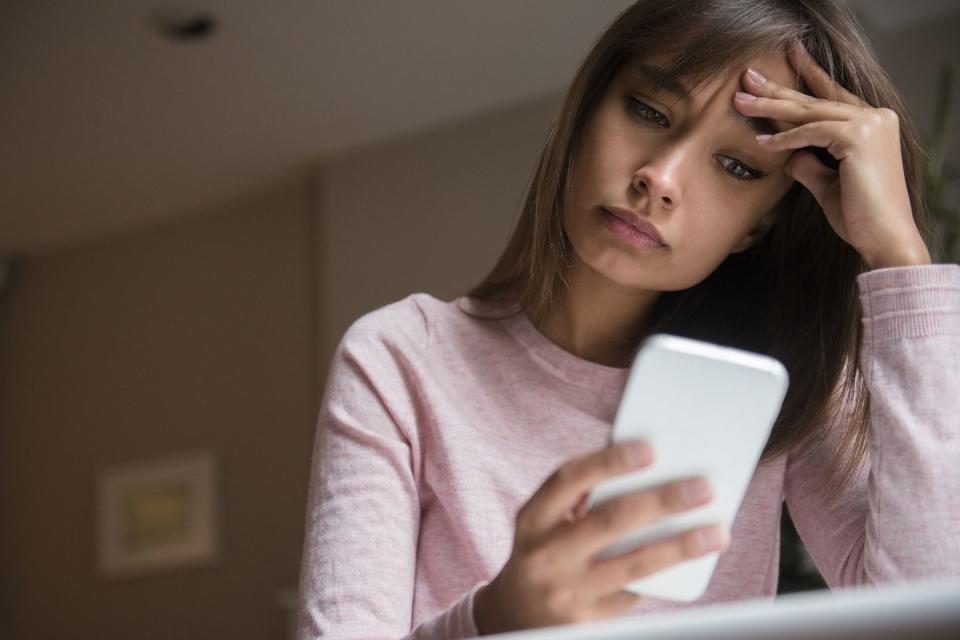How to cope with anxiety

Most people feel anxious at times. We can likely all bring to mind that feeling of worry or dread, accompanied by a sensation of ‘butterflies’ in the stomach (or even nausea), in the face of a job interview, upcoming presentation or exam.
When it’s related to a specific event or situation, like those mentioned above, anxiety can sometimes have positive connotations, helping to focus the mind on an unpleasant task. In instances like these, the anxiety is often short-lived and will go away completely once the event has passed.
Anxiety only becomes a mental health concern if it becomes a fairly constant presence in your life, affecting the way you live. It could be that you experience daily ‘free-floating’ anxiety, your anxiety is out of proportion to the situation at hand, or you’ve started avoiding certain places, situations or events because of your anxious thoughts.
If you’re struggling to manage your anxiety, know that you’re not alone. In fact, the World Health Organisation reports that anxiety disorders are the most common mental disorders worldwide, with one in 13 people suffering globally.
We spoke with the experts, to discover exactly what anxiety is, why it happens and how you can help to alleviate it, as well as how you can support someone else who is suffering.
What is anxiety?
We likely all know what anxiety feels like – but why does it happen?
‘Anxiety is an emotional state in response to a perceived stress,’ explains Gael Lindenfield, psychologist and author of Weathering The Storm. ‘Its self-protective function is to quickly prepare us for a fighting off or fleeing away from something we perceive as a threat.’
Lindenfield explains that this ‘fight or flight’ response can see us experiencing symptoms that include:
Tense muscles (or at worst, muscle paralysis)
A racing heart
A dry mouth
Pressure on or around our head, or headaches
The inability to think clearly and decisively
Rapidly flitting thoughts or mind blanks
Common anxiety triggers
While your anxiety may be caused by a variety of factors, including genetics and environmental stressors (such as the current COVID-19 pandemic), you may find certain situations, events or emotions trigger episodes of anxiety for you.
‘Triggers often include anything that we may perceive as threatening to the wellbeing of ourselves or people we love, perceived threats to our survival, or anything that we might feel is beyond our capability, but we still think we have to do,’ reveals Lindenfield.
She explains that the stresses of modern living and an increase in time spent on social media can serve to heighten our anxiety.
‘In our highly competitive modern life, we are often being asked to stretch our capabilities and, on screen, we can always find examples of people doing better than us. Inevitably, we are bound to see images and information online that we perceive as threatening to our wellbeing, survival or our ability to do something that we want to do or have to do.’
Coping with anxiety
So, how can you go about controlling episodes of anxiety?
Lauren Calaghan, psychotherapist and author of How Can I Help?, says that knowledge is power and that to control your anxious thoughts, it’s important to understand where they’re coming from.
‘Notice what your triggers are,’ she says. ‘What are the things that cause you to feel anxious? It could be anything – other people, places, environments, events, TV shows, something you read, your own thoughts or physical sensations. It can be one specific thing or multiple things. The more you know about your anxiety, the easier tackling it is. Anxiety is not random, even if it appears that way sometimes.’
Asking for help
If you feel like your anxiety is growing, or you feel unable to cope, it’s probably time to ask for support.
‘It’s normal to feel a bit overwhelmed by anxiety, but if you are feeling like this a lot of the time, or the anxiety is getting worse, or it is having a significant impact in your life – for example, work or relationships – and preventing you from living the life you would like to lead, then it’s important to ask for help,’ says Calaghan. ‘Your GP is a good place to start – they can help refer you on to a psychologist or CBT therapist. You may also prefer to seek help from a psychologist first, or a CBT therapist who has experience of working with anxiety problems.’

Self-help for anxiety
If you’re struggling with anxiety right now, there are techniques you can use to help you feel calmer and more grounded:
Breathe more deeply
Taking a series of slow, deep breaths will activate the parasympathetic nervous system, helping you to feel relaxed and moving you out of ‘fight or flight’ (which is governed by the sympathetic nervous system). Simply focusing on inhaling slowly and exhaling deeply can work to calm both the physical and mental symptoms of anxiety.
Try not to fast forward
If you examine your anxious thoughts, you will likely notice that they are rooted in possible future events or imagined worst-case scenarios. ‘What if?’ is a common question that leads to anxiety. Instead, try to focus on this moment, here and now. Are you safe? Is everything OK in this moment? If there’s something you need to address in relation to your anxiety, either make time right now to action it, or write yourself a reminder to action it at a future date. Doing so will help to free up your mind.
Practise being mindful
‘Mindfulness is about being present in the moment, being non-judgmental and noticing your thoughts for what they are – just thoughts,’ explains Calaghan. ‘It can be beneficial for many people, especially if you find it hard to relax and calm your mind.’
To start your mindfulness practice, focus your attention first on something you can see, then something you can hear, then something you can smell, then something you can feel. Using your senses to ground yourself in this way can move your mind away from your thoughts and into the physicality of your body and the world around you, here and now.
But Calaghan reminds that, as helpful as mindfulness is, it’s important to address any underlying issues, too.
‘If you have a diagnosable anxiety disorder, such as OCD, social anxiety or panic disorder, mindfulness is not a proven treatment,’ she says, ‘so I would recommend getting treatment for the problem first, so the mindfulness doesn’t camouflage the problem.’
How to help someone else with anxiety
Supporting someone else with anxiety can be daunting, especially if you don’t understand why they’re feeling the way they do. Calaghan suggests the following tips to help:
Be compassionate – they are not choosing to be this way.
Educate yourself – the more you know about anxiety, the better equipped you are to support someone.
Be prepared for some conflict – it’s hard for everyone when someone you care for suffers from anxiety, and conflict can help make way for change.
Encourage them to get professional help – there are good treatments for anxiety that work.
Don’t take responsibility for their problem – you cannot make it better on your own, so don’t take on responsibility for their anxiety.
Take care of yourself, too – you need to have good mental health to support someone who is suffering from anxiety.
If you are struggling with feelings of stress or anxiety, your first port of call should be your GP who will be able to listen to your symptoms and experiences, and then recommend the best course of action for you. For additional support, try one of the following resources:
Anxiety UK: a charity which specifies in helping those suffering from anxiety.
The Samaritans: a charity providing support to anyone in emotional distress.
Mind: a charity making sure no one has to face a mental health problem alone.
CALM: helping to reduce stigma and reduce rates of male suicide.
Last updated: 21-05-2020
You Might Also Like

